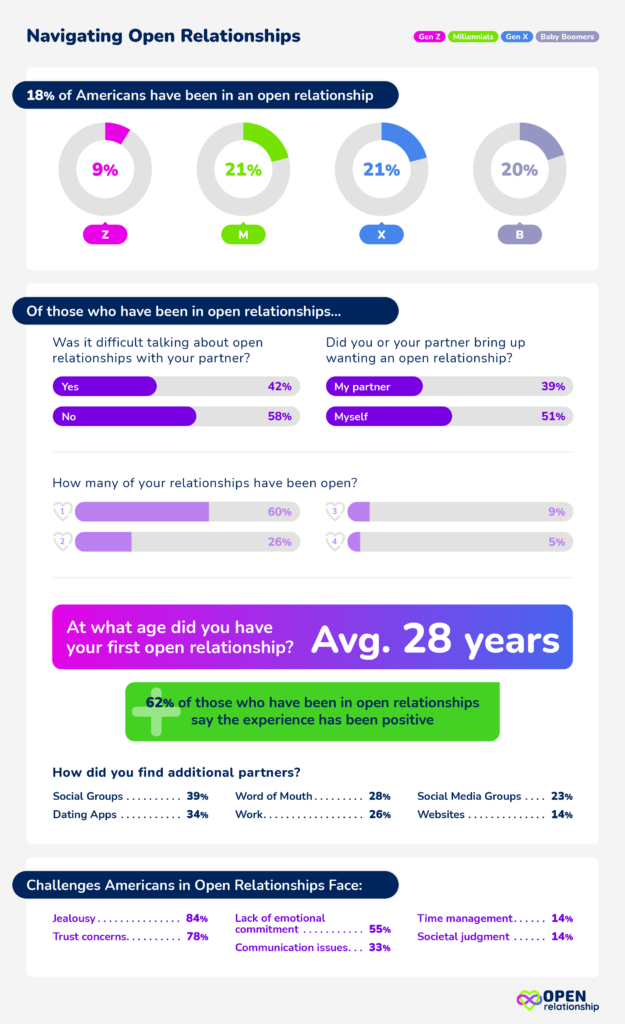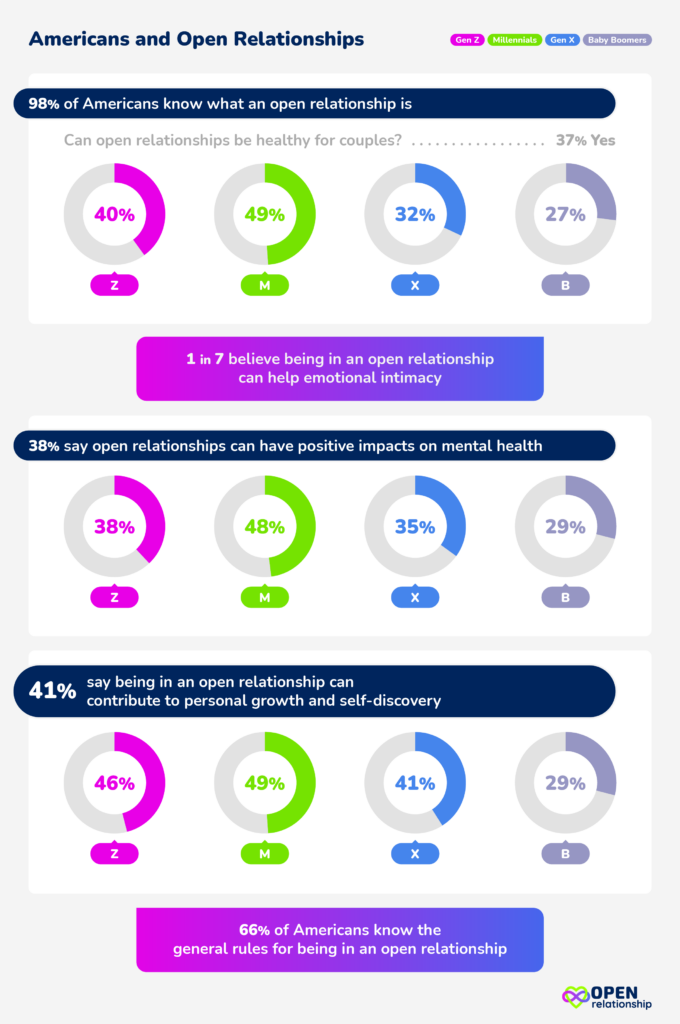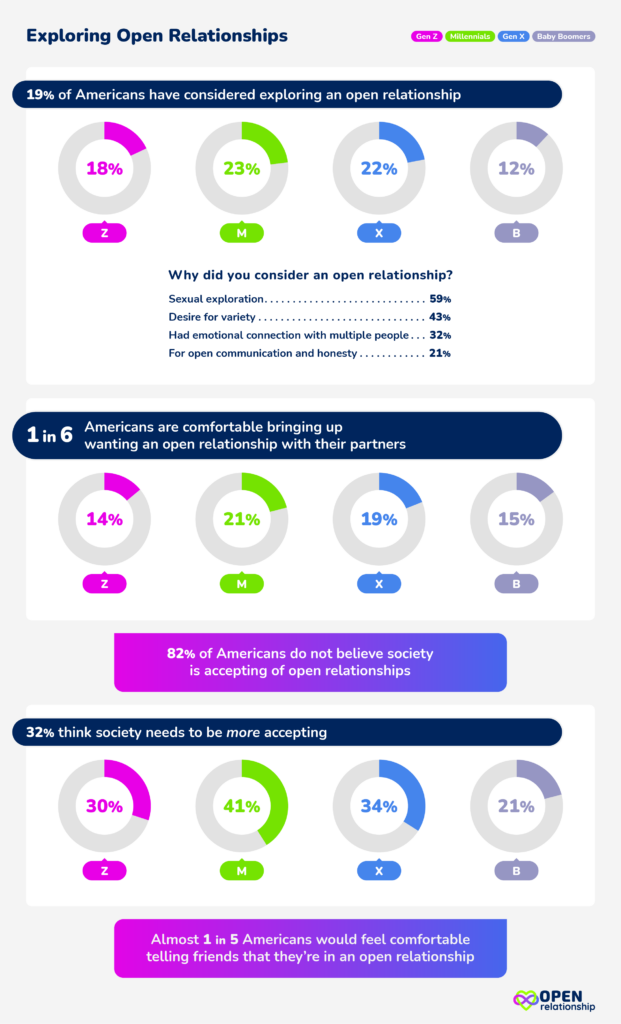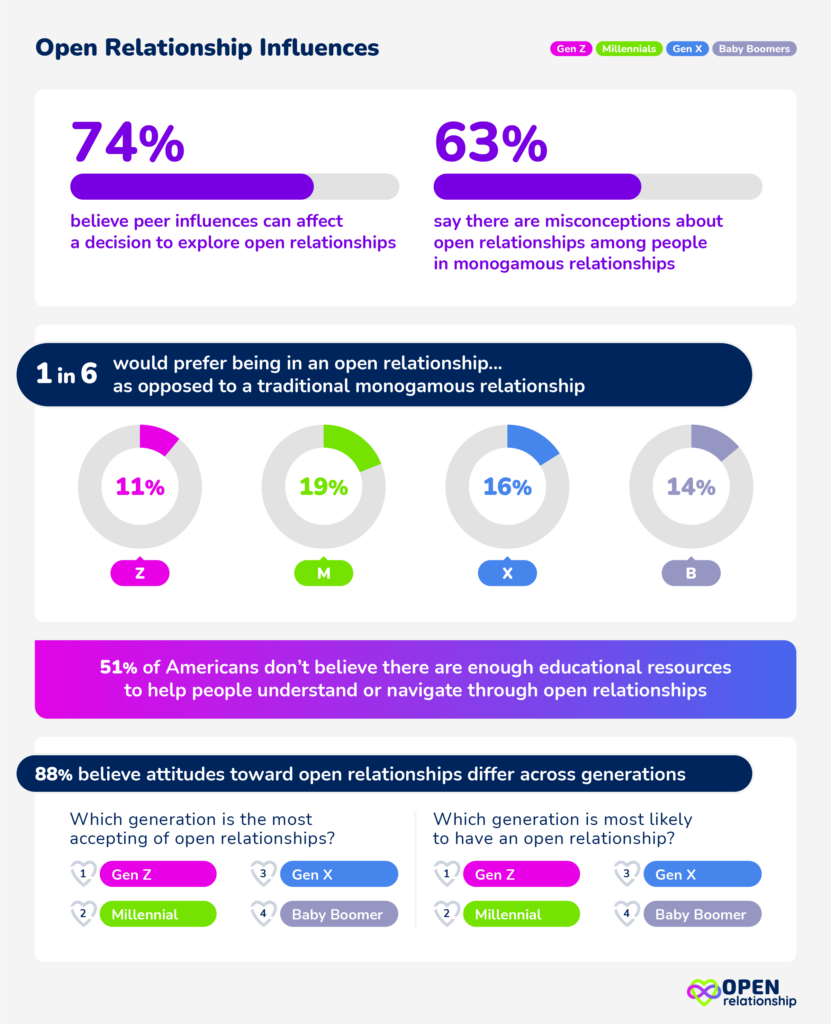In a world where the definition of love is continually evolving, interest in non-traditional relationships, particularly open relationships, continues to grow. Exploring non-traditional relationships is gaining traction in America, with a new survey finding nearly 1 in 5 Americans having been in an open relationship.
OpenRelationship, a dating app and website that offers modern dating for everyone, wanted to better understand this growing trend among different generations. While challenges and societal stigma exist, many who have been in open relationships report positive experiences and believe that openness can contribute to personal growth and well-being.
For this study, Gen Z includes survey respondents between the ages 18 to 26, Millennials are 27 to 42 years old, Gen X are ages 43 to 58, and Baby Boomers are from ages 59 to 77.
Navigating Open Relationships

While nearly 1 in 5 Americans have been in an open relationship, the generations that have been in the most open relationships include Millennials (21%) and Gen X (21%). Following are Baby Boomers (20%), with Gen Z trailing (9%).
Of those Americans who have been in an open relationship, 42% found it challenging to broach the subject with their significant other, while 58% said that discussing open relationships wasn’t a hurdle.
Who initiated those conversations? For more than half (51%), they brought up the topic, while 39% said it was their partner who brought up wanting an open relationship. The majority (60%) have only had one open relationship, with 26% engaging in two, and a smaller percentage exploring three or more. On average, Americans who have had an open relationship had their first one at the age of 28.
The majority (62%) of Americans who have had open relationships found the experience to be positive. How did they find additional partners? The most popular way was through social groups, followed by dating apps, word of mouth, work, social media groups, and websites.
There are some challenges and concerns when exploring open relationships. More than 4 in 5 say jealousy is a primary difficulty, followed closely by trust issues at 78%. Additionally, 55% expressed concerns about a lack of emotional commitment, while 33% struggled with communication issues.
Americans and Open Relationships

As open relationships continue to grow in popularity, 98% of all Americans surveyed are familiar with the concept of open relationships. When it comes to the general rules of open relationships, 66% of Americans say they know them.
Opinions vary across generations about the healthiness of open relationships for couples. According to survey data, 37% of respondents believe open relationships can be healthy for couples. Breaking it down further, 40% of Gen Z, 49% of Millennials, 32% of Gen X, and 27% of Baby Boomers share this perspective.
Interestingly, 1 in 7 believes that being in an open relationship can help emotional intimacy, suggesting that open relationships may be a unique way to help deepen emotional connections with your primary partner. Additionally, 38% said open relationships can positively impact mental health. Again, this differs across generations, with 38% of Gen Z, 48% of Millennials, 35% of Gen X, and 29% of Baby Boomers believing in the positive mental health effects of open relationships.
Exploring open relationships can also contribute to personal growth and self-discovery, according to 41% of Americans. When we look at this breakdown by generation, Gen Z (46%) and Millennials (49%) felt the strongest, followed by Gen X (41%) and Boomers (29%).
Exploring Open Relationships

Of Americans who have never been in an open relationship, 19% have considered exploring one. The generation most interested in exploring open relationships is Millennials (23%), followed by Gen X (22%), Gen Z (18%) and Boomers (12%). When it comes to reasons for considering an open relationship, the number one reason was a desire for sexual exploration, followed by a desire for variety, having an emotional connection with multiple people, and open communication and honesty.
1 in 6 Americans who have never had an open relationship would be comfortable discussing this desire with their partners. Of those comfortable, Millennials take first (21%), followed by Gen X (19%), Boomers (15%), and Gen Z (14%). Nearly 1 in 5 add that they’d feel comfortable telling friends they’re in an open relationship.
Despite the growing trend in popularity, 82% of Americans do not believe society is accepting of open relationships. In fact, 32% believe society needs to be more accepting.
Open Relationship Influences

The majority (74%) believe peer influences can affect the decision to explore open relationships. Additionally, 63% believe there are misconceptions about open relationships among those in monogamous partnerships.
But attitudes among Americans are shifting when it comes to open relationships, with 1 in 6 saying they’d prefer an open relationship over a traditional monogamous one. This desire differs among the generations, with Millennials (19%) as the most interested generation, followed by Gen X (16%), Boomers (14%), and Gen Z (11%).
When it comes to stereotypical beliefs among generations and their views on open relationships, most Americans (88%) would agree that attitudes differ among generations. The generation Americans think is the most accepting of open relationships is Gen Z, and it’s also the generation Americans believe to most likely be in an open relationship.
For those interested in exploring open relationships, there’s a desire for educational materials, as 51% say there aren’t enough resources available to help people understand or navigate an open relationship.
While challenges and societal stigma exist, those who have been in open relationships report positive experiences and believe that openness can contribute to healthy relationships. As attitudes continue to shift, considering an open relationship can be a healthy option for couples seeking to explore different ways of loving and connecting.
Methodology
In November 2023, we surveyed 1,004 Americans to get their feedback on dating and open relationships. Respondents were 48% female, 50% male, and 2% non-binary with an age range of 18 to 76 and an average age of 43 years old. Respondents surveyed were evenly split between age groups of Gen Z, Millennials, Gen X, and Baby Boomers.
Respondents self-identified as 82% heterosexual or straight,11% bisexual, 3% gay, 2% lesbian, and 2% chose not to respond. Respondents were 40% married, 28% single, 19% in a relationship but not married, 9% divorced, 3% widowed, and 1% separated.
For media inquiries, contact [email protected]
Fair Use
When using this data and research, please attribute by linking to this study and citing openrelationship.com


